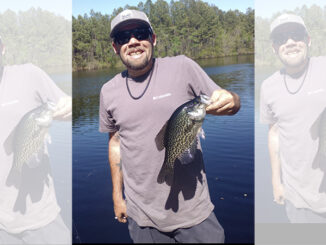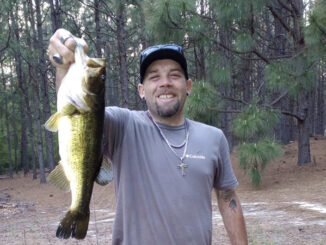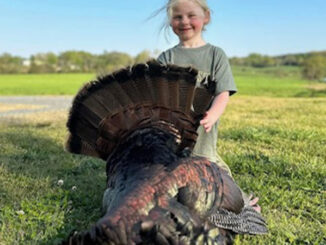
Joseph W. Cotten Jr. may not have killed the oldest wild turkey in North Carolina during the 2011 spring season, but he almost certainly was the most venerable Tarheel State native to bag a gobbler.
At 92 years old, Cotten, who was born and raised in Scotland Neck, killed a gobbler on May 7, the final day of the season, in Halifax County.
“He hadn’t killed a turkey in eight years,” said Cotten’s grandson, Joseph W. Cotten IV. “This was the only time he hunted this season, too, after going three times with me last year.
“Last year was really tough because we had birds close every time, but we couldn’t get them close enough to seal the deal, so this was really a treat for me and him.”
The younger Cotten said his grandfather, born Jan. 19, 1919, remains in relatively good health and has the stamina to walk a few hundred yards over flat terrain, but his hearing is poor.
“That’s been a drawback in the past because I’ve had to talk pretty loud for him to hear me,” said the younger Cotton, who avoided that problem this spring by taking a notebook to write in and show his grandfather while they were in a turkey blind.
“We went in the afternoon, and my fiancée, Amber Bell, was with us,” the young Cotten said.
They drove to within 75 yards of a food plot at some land adjoining his grandfather’s old family farm.
“A friend of mine told me a few days earlier I should take grandfather to his land because he had some places that hadn’t been hunted all year long,” he said.
Cotten IV, 23, set up a stake blind with a cloth camouflage cover at the edge of a chufa food plot next to a swamp.
“Once we got Grandpa into the blind and situated, I called just once and a gobbler answered me immediately from the swamp,” he said. “It was kind of a shock, really, because you don’t expect a bird to answer that quickly in the afternoon.”
The elder Cotten whispered and asked his grandson ‘Did I just hear a turkey?’ and the youngster scribbled on his notebook, “YES!”
Cotten was using a slate call, and the turkey answered him four more times within a matter of minutes.
“He came running to our decoys after I called one last time,” said Cotten IV, whose landowner friend had mowed a lane in some clover planted around the chufa plot’s edge so turkey hens would have good places to make nests.
“Amber was sitting on my right where you could see the clover, and she whispered real excited, ‘Joey, Joey, look!’ ” he said. “When I looked, I saw the gobbler running flat out toward the full-strut decoy I’d placed in front of the stand with a couple of hen decoys.
“I saw Grandpa’s eyes light up when he saw that turkey. He nudged me in the ribs.”
The gobbler ran to the fake gobbler, puffed up and appeared to be ready to spur the decoy.
“But he was on the wrong side of the decoys (for a shot),” the younger Cotten said. “Then he walked out on the other side and Grandpa had a perfect 15-yard shot.”
The elder hunter, who has killed 20 to 25 turkeys over the years, raised his Remington 1100, loaded with copper-plated No. 5 Federal shot shells, and pulled the trigger.
“He knocked him over, but we were so close I don’t think many of the pellets hit the turkey,” Cotton IV said.
The bird flopped about five feet to the left, and Cotten Jr. poured another finishing load into the bird.
“Before we went hunting that day, I asked Grandpa if he didn’t want to use a 20-gauge gun instead of the 12 gauge, but he said he’d killed every turkey with that gun and he wasn’t going to change now,” his grandson said.
The gobbler weighed 19 pounds, sported a 10-inch beard and had 1 1/4-inch spurs.
Joseph Cotten Jr., who killed his first Halifax County turkey in 1948, lives in Virginia Beach and owned an office furniture business in Norfolk before retiring. He returned home many times over the years to hunt with friends and family in Halifax.
“Me and my grandson have worked a long time making food plots, planting clover and sawtooth oak trees for wild turkeys,” said the elder Cotten. “That all is paying off now because we’ve got a lot more turkeys now than we had back in those days.”
“He still considers himself a North Carolina native,” said his grandson. “There’s no doubt about that; he tells everyone he’s from North Carolina. He’s been coming back to the family farm, where they raised tobacco and cotton when he was growing up, every year of his life.”
The Cottens are related to the late Joseph Cotten, a famous movie actor in the mid-1900s whose ancestors populated Edgecombe County and whose grandparents lived in Tarboro.
“This (successful turkey hunt) all happened so fast I didn’t have time to get my video camera up, and I’d brought it along,” said the young Cotten. “That’s the only thing I regret about this trip. I was gonna film what happened.”
That didn’t bother the elder Cotton.
“I just appreciated Joey taking me hunting again,” he said. “We’ve had a strong bond for a long time.”
To see a vintage photo of Mr. Cotten with a turkey taken in 1948 visit the Turkey Hunting forum.





Be the first to comment